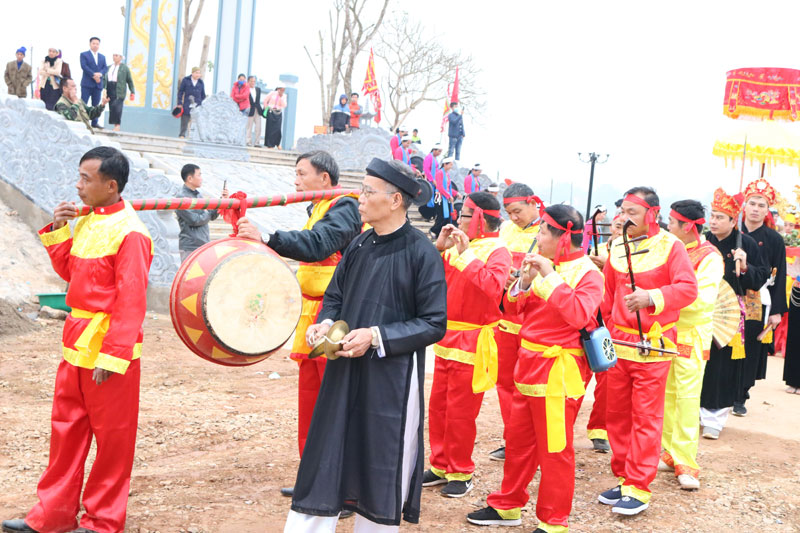



The ceremony to welcome the dragon palanquin at the ceremony of Khoi communal house in An Nghia commune (Lac Son).
According to the folk legends of the Muong ethnic people and the accounts of the elderly people in the region, since ancient times Quoc Mau Hoang Ba and the gods often arrived here to teach Muong Khoi people to explore upland fields and to close the river to prevent rivers from rising water, to build water trucks, to take water to fields and how to transplant rice, and grow cotton to weave cloth. Being grateful for the merit, the teachings of Quoc Mau and the kings, the people in the area have built the communal house to worship the gods, the Imperial Citadel of Muong in Muong Khoi.
Whenever spring comes, the people in the region arrive in Khoi communal house to perform the rituals to worship, to thank the achievements in the previous year, to wish a lucky new year with good harvest, security for the nation and peace and happiness for the people. Experiencing the ups and downs of the history, the relics of Khoi communal house has been destroyed, the festival of the ancient Khoi communal house has also been interrupted for a long time.
In order to preserve and promote the traditional cultural identity values of the Muong ethnic people to meet the needs of spiritual and cultural activities of the people in the area, the festival of Khoi communal house has been restored and held in 2 days (January 8-9, the year of Rat, 2020) at Khoi communal house in Kham Set field, Lao Thanh hamlet, An Nghia commune. In the festival, there are rituals memorizing those who have built Muong areas. They include a procession of welcoming the King Hoang Ba to the ceremony, the rituals of De Ding hoping for luck and praying for good health for the new year, the rituals of crossbow shooting in the water to gain luck in the new year, and the rituals of horse racing.
After the solemn rituals the people are eager to participate in the exciting arts performances and sports activities with many folk games such as double-handed singing competition, Thuong Giang, Bo Meng and Xec Bua singing competitions, De Kha contest, throwing cotton ball game, Khang and Mang fighting, shooting crossbow, pushing sticks, volleyball and so on. The festival is solemnly held and it has become a great cultural event for the people of An Nghia commune and the surrounding areas.
Mr. Bui Van Chanh, the Vice Chairman of the People's Committee of Lac Son district says: In order to preserve and promote the values of the traditional cultural identity of the Muong ethnic group, the People's Committee of Lac Son has coordinated with the Department of Culture, Sports and Tourism to gradually complete the scientific documents, proposing to rebuild the communal house and the festival of Khoi communal house in An Nghia commune.
After a long hiatus, the festival of Khoi communal house was restored earlier this year and it will be held periodically in January every year. The restoration of the festival of Khoi communal house has an important meaning in the spiritual and belief culture of Muong Khoi people in particular and the people of Lac Son district in general. Thereby, it contributes to conserving, preserving and promoting the long-lasting cultural and historical values of the Muong ethnic people in Lac Son, arousing the traditions and the solidarity to continue implementing the objectives and tasks in the local economic, cultural and social development.
The restoration of the communal house and the festival of Khoi communal house are the pride of the people of An Nghia commune in particular and the people in Lac Son district in general. At the same time, it helps to link up the revolutionary historical sites of the War Zone in Muong Khoi, the historical - cultural relics of Coi communal house and the tourism sites in the district, helping to promote and attract tourists, as well as develop economy and culture in the area.